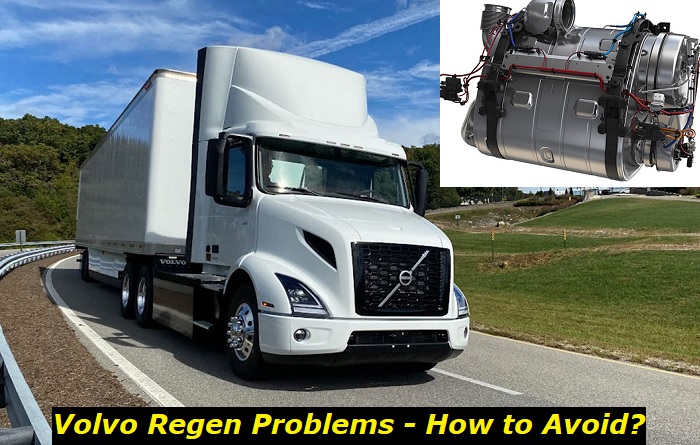Volvo Trucks is a truck manufacturing division of the Swedish auto company Volvo. It is among the largest truck builders in the world, selling its products in over 140 countries. Volvo Truck is a trusted brand worldwide thanks to its excellent dealer network supported by industry-leading original parts.
Volvo Trucks is responsible for building some of the most fuel-efficient trucks, most of which are powered by diesel engines.
Like all diesel engines, Volvo diesel powertrains are equipped with Diesel Particulate Filter, a device designed to minimize harmful emissions by removing diesel matter from the exhaust gas. Often referred to as DPF, the diesel particulate filter collects and stores exhaust soot. However, the DPF only has a finite capacity, which means the accumulated soot must be cleaned to regenerate the DPF. The process of cleaning is called DPF regeneration.

What is Regeneration
A diesel particulate filter regeneration or DPF regen is the process of burning the accumulated soot from the face of the DPF. This helps to prevent clogging. Your Volvo truck could regenerate in two cycles, passive or active.
Passive regen is the most common cycle. This happens when the truck is in motion. When the exhaust gas temperature rises to the required level, the heat automatically burns off the diesel particulates off the DPF. When the exhaust gas isn't quite hot, but the DPF requires a regeneration, the engine injects some diesel fuel into the exhaust stream to increase the temperature. When the temperature is high enough, the DPF burns ofF the accumulated soot in a cycle called active regen.
If these two cycles fail, the truck usually is in danger of DPF clogging, which could cause more problems. When passive and active regens fail, a forced or manual regeneration is required, which the driver can initiate using a manual switch.
When initiating a manual regen, the truck has to be stationary. The engine should operate at optimal temperature, and the parking brakes should be engaged. While this can be inconvenient as it interferes with the driver's schedule, it is necessary as it minimizes the chances of your truck going into limb mode. It also protects the DPF and engine from more damage.
Volvo Regen Problems - Common Causes and How to Avoid Them
Diesel particulate filter captures over 90 percent of harmful exhaust pollutant particulates. These particles are toxic to humans and other living things. These particles are created by the partial combustion of diesel fuel. One factor contributing to incomplete fuel combustion is the quality of fuel you feed your Volvo truck. The vehicle's fuel system also needs to be in perfect condition.
The DPF is designed to capture these particulates. When the filters are filled with soot, the DPF burns them off in the regen process. However, the regeneration process may fail because of one or more reasons.
Causes of DPF Regeneration Failure
- Malfunctioning AHI Dosing Module
The AHI dosing system module or aftertreatment injection shut-off valve is crucial in the Volvo diesel engine's regeneration process. It controls and regulates the amount of diesel going through the 7th injector during the regen process.
The hydrocarbon doser is designed to inject a small amount of diesel into the exhaust stream to create enough heat for active or forced regeneration. If the AHI dosing module faults, the vehicle's computer system will detect the issue and throw in a fault code. While many people relate these fault codes with the 7th injector, most of the time, it is the AHI dosing module with the issue.
A blocked doser can make it impossible for the exhaust gas to attain the required temperature for successful regeneration. All regen processes will fail if your Volvo truck has a faulty AHI dosing module.
- Faulty Turbocharger
A turbocharger is an air pump that supplies air for combustion at a higher density and pressure than ordinary air. The turbocharger air has a higher oxygen concentration, improving fuel combustion and increasing power output. A turbocharger also allows for cleaner emissions and increased torque outputs.
There are several factors that could cause issues with the turbocharger. The turbocharger helps to build enough heat for the regeneration process to start. If the turbocharger is faulty, it could lead to a failed regen process, eventually damaging the DPF.
- Faulty Diesel Oxidation Catalyst
Like other diesel engines, Volvo equips their diesel powerplants with diesel oxidation catalysts or DOCs. The function of the catalyst is to remove hydrocarbonates and carbon monoxide from the exhaust gases, producing the nitrogen dioxide that helps the DPF effectively burn off the collected soot.
If the DOCs inlets are blocked or the system malfunctions, it prevents the flow of the hot exhaust gases into the DPF. As a result, the collected soot will not be burned off, hence a failed DPF regen process.
- Faulty DPF Differential Pressure Sensor
Your Volvo diesel truck is equipped with a DPF pressure sensor. This device measures the backpressure in the exhaust system and signals the powertrain control module when to initiate a regen process. The differential sensor is a crucial part of the DPF, keeping it in perfect condition. A blocked DPF can cause catastrophic damage to the engine.
As with engine sensors, the DPF pressure sensor is connected to the ECU with wires, which can be damaged due to harsh driving environments and vibrations. The cables can also crack or melt due to the extreme heat in the exhaust area. The sensor hose pipes can also be clogged by the exhaust soot.
When one of these issues arises, the DPF pressure differential sensor will no longer determine the exhaust backpressure accurately. As a result, the powertrain control module will not initiate a DPF regeneration at the right time. This results in failed DPF regen processes and could eventually damage the DPF.
How to Avoid Volvo Regen Problems
- Drive at High Revs for Longer Distances
Drivers are encouraged to take a low-rev driving approach for a smoother, quieter experience. Most Volvo trucks offer a faster torque response when driving at low revs. However, while this sounds like a fantastic idea, it is not always a blessing to diesel engines. Because of the temptation of a comfortable ride, many truckers drive at very low rev limits, making the engine warming-up process too slow.
This also means that the regeneration process may never be initiated since the required temperatures are never achieved. If you drive at low revs for too long, the soot accumulation will clog the DPF.
Driving longer distances gives your truck enough time to finish the regen process. If you keep interrupting the process by driving short distances or sticking to urban streets, your DPF will eventually clog.
- Check your DPF Regularly
You can always check your particulate filter every time your Volvo truck is serviced. There's special equipment for diagnosing DPF, which your local mechanic can use to inspect the condition of the particulate filters. You can initiate the manual regen if the DPF requires cleaning during service. This way, you can avoid the inconveniences you experience when the DPF gets clogged and forces you to park and clean the DPF.
- Always Use the Right Quality Engine Oil
The effectiveness ad longevity of the particulate filters depends on the quality of oil used in the engine. Using the wrong engine oil decreases the lifespan of the DPF.
- You can use DPF Cleaners
For drivers stuck in environments where the required exhaust temperatures for a proper regen process can never be attained, truckers can opt to use DPF cleaners to maintain the particulate filters preventively. This is also true for short-distance truckers.
The market has several DPF cleaners designed to facilitate particulate filter regeneration when the filters have reached their maximum soot accumulation. Preventive use of these DPF cleaners could keep your truck from developing DPF regen problems.
- Keep Your Truck's Fuel System In Proper Maintenance
If your truck's fuel system has issues, the diesel particulate filter cannot regenerate to completion. The process requires some fuel injected into the exhaust stream to facilitate the increase of exhaust gas temperature. If a part of the fuel system, for example, if the injectors aren't working properly, it may fail to inject the required diesel into the exhaust stream, hence low temperatures and a failed regen process.
There are additives designed to clean the entire fuel system of your truck. These cleaners work perfectly to prevent corrosion in the system and condensation in the fuel tank. The cleaners also clean the injectors to ensure a proper flow of fuel into the combustion chambers.
Conclusion
You can avoid long hours pulled over by the roadside due to regen problems. If you find yourself experiencing endless forced regens, you have a regen problem that needs fixing. If you are not sure of the issue causing regen problems in your truck, visit your nearest Volvo mechanic and have the DPF checked.
About the authors
The CarAraC research team is composed of seasoned auto mechanics and automotive industry professionals, including individuals with advanced degrees and certifications in their field. Our team members boast prestigious credentials, reflecting their extensive knowledge and skills. These qualifications include: IMI: Institute of the Motor Industry, ASE-Certified Master Automobile Technicians; Coventry University, Graduate of MA in Automotive Journalism; Politecnico di Torino, Italy, MS Automotive Engineering; Ss. Cyril and Methodius University in Skopje, Mechanical University in Skopje; TOC Automotive College; DHA Suffa University, Department of Mechanical Engineering






Add comment